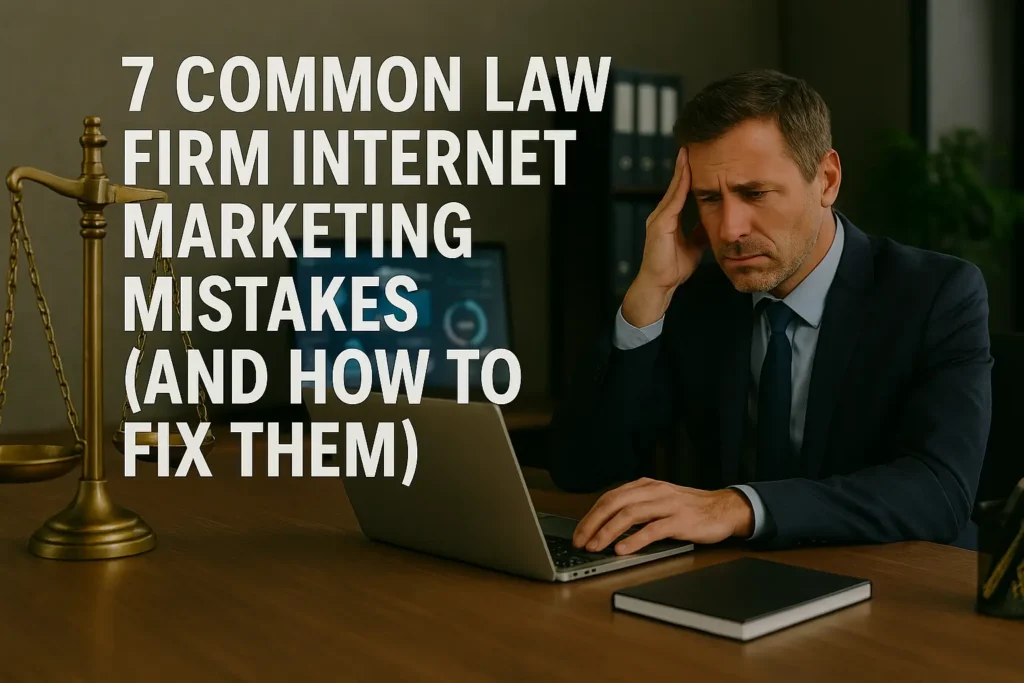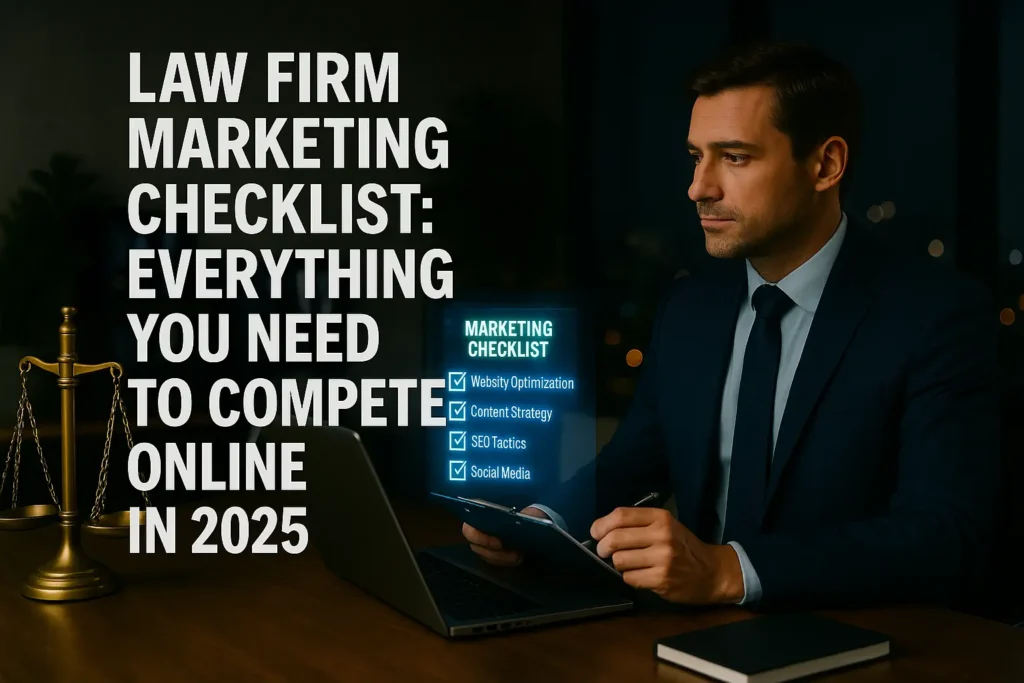In today’s hyper-digital legal landscape, simply having a website isn’t enough. Law firm internet marketing requires strategic thinking, consistent execution, and a deep understanding of how potential clients search, evaluate, and choose legal representation online.
This article shares 9 proven internet marketing strategies tailored specifically for law firms that want to attract more high-quality clients — without wasting budget or relying solely on referrals.

Law Firm Internet Marketing
1. Optimize Your Google Business Profile (GBP)
Most legal clients begin their search on Google — and Local Pack listings get the bulk of the clicks. A fully optimized GBP can be your firm’s highest-converting asset.
How to optimize:
- Fill out every section (categories, hours, phone, website, appointment links)
- Add professional photos of your office and attorneys
- Post weekly updates (news, tips, events)
- Collect and respond to client reviews
- Use the Q&A feature to address common questions
Tip: Firms with 50+ reviews and a 4.7+ rating consistently outperform competitors in local search.
2. Use Targeted Google Ads for High-Intent Leads
Google Ads remains one of the fastest ways to get your firm in front of people actively searching for legal help.
Best practices:
- Bid on long-tail, service-specific keywords like “divorce lawyer in San Diego” or “DUI attorney near me”
- Use call-only and click-to-call ads during office hours
- Send visitors to a dedicated landing page (not your homepage)
- Use location extensions and call tracking
Case Example: A personal injury firm in Atlanta decreased their cost-per-lead by 32% by targeting zip-code specific campaigns and creating mobile-optimized landing pages.
3. Create Location-Specific Practice Area Pages
Instead of a single “Services” page, build dedicated landing pages for each practice area and location you serve.
For example:
- /dui-lawyer-los-angeles
- /family-law-attorney-sacramento
- /immigration-lawyer-orange-county
Each page should include:
- Keywords relevant to the location and service
- Client testimonials or case results
- A strong call to action (CTA)
- Schema markup for better indexing
These pages boost your SEO, increase conversions, and help you dominate local search results.
4. Build a Legal Content Engine (Blog + Guides)
Clients often have questions before they’re ready to hire. A blog positions you as a helpful expert and improves your SEO with long-tail keywords.
Topics to cover:
- “Can I be arrested without a warrant in [state]?”
- “What happens after a DUI arrest in [city]?”
- “How is child custody decided in [state]?”
Format ideas:
- Short legal explainers (500–800 words)
- Long-form guides (1500–2000+ words)
- Case commentary (non-confidential summaries)
- Infographics or checklists
Pro Tip: Add internal links from blog posts to related service pages to boost site authority and user flow.
5. Collect and Showcase Client Reviews
Social proof is critical in legal marketing. Online reviews act as your digital word-of-mouth and heavily influence trust.
Strategies:
- Ask for a review at the conclusion of every successful case
- Use a tool like Birdeye, NiceJob, or Google’s own short link
- Highlight 5-star reviews on your website
- Reply to reviews publicly — both good and bad
Fact: 87% of consumers read reviews for local businesses, and legal services are one of the top-reviewed sectors.
6. Retarget Lost Visitors with Display or Social Ads
Most visitors to your website won’t convert on the first visit. Retargeting helps bring them back when they’re ready to take action.
Channels to use:
- Google Display Network
- Facebook & Instagram retargeting
- LinkedIn (for B2B or corporate law)
What to show:
- Testimonials
- “Book Your Free Consultation” offers
- Practice area highlights
- Trust signals like badges, years of experience, awards
Tip: Keep your retargeting window between 7–30 days depending on practice area urgency.
7. Launch an Email Nurture Campaign for Cold Leads
Email marketing isn’t just for eCommerce. It’s a powerful tool for law firms to stay top-of-mind with leads who aren’t ready to commit.
Setup:
- Use tools like Mailchimp, ActiveCampaign, or ConvertKit
- Segment based on interest or service area
- Send 4–5 emails over 3–4 weeks with helpful content:
- “3 things to know before filing for divorce”
- “How to prepare for your first consultation”
- “Common myths about [your practice area]”
Bonus: Offer a free legal guide or consultation reminder as a lead magnet.
8. Use Video to Build Trust and Answer Questions
Video humanizes your firm. It lets potential clients see your face, hear your voice, and feel confident before contacting you.
Easy video ideas:
- “Meet Our Team” intro videos
- 60-second answers to FAQs
- Walkthrough of your consultation process
- Office tour or behind-the-scenes clips
Post on:
- YouTube (for SEO and discovery)
- Your website
- Facebook, Instagram, or LinkedIn
Stat: Pages with videos see up to 80% more time spent on site.
9. Track Everything — And Adjust Often
What gets measured gets improved. Set up tracking from day one to understand where your leads are coming from and what converts.
Track:
- Phone calls (CallRail, WhatConverts)
- Form submissions
- Ad performance (Google Ads dashboard)
- Website traffic and bounce rate (GA4)
- SEO keyword rankings (Ahrefs, Semrush)
Pro Move: Use a custom dashboard (Google Looker Studio) to track lead sources, ROI, and campaign performance weekly.
Final Thoughts
Marketing a law firm online in 2025 takes more than a logo and a few ads — it requires a strategic mix of trust-building, SEO, paid traffic, and lead nurturing. Start with what you can do today, whether it’s optimizing your Google profile, writing a blog, or collecting client reviews.
Then scale gradually using the strategies above. The most successful firms in digital marketing aren’t the flashiest — they’re the ones who execute with clarity and consistency.
Frequently Asked Questions
👉 Read: The Complete Guide to Law Firm Internet Marketing in 2025




